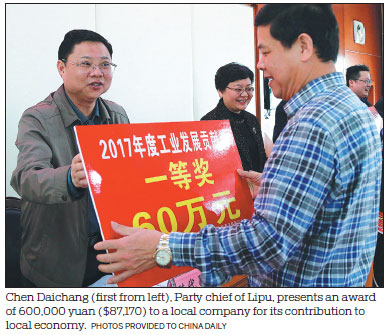New-look city of Lipu hits the fast track to success
With Lipu in the Guangxi Zhuang autonomous region having evolved from being a county into a city, its growth is now on the fast track, according to local officials.
After the State Council, China's cabinet, gave the green light to the change in July, the Guangxi authorities announced the news in early September.
Lipu will embrace "golden opportunities" for its development, as it is expected to attract more investment projects, capital and human resources as a regional city center, said Chen Daichang, Party chief of the city.
Situated in the northeast of Guangxi in southern China, Lipu is a transportation hub in the region, with two highways running through it and three expressways still under construction, which are scheduled to go into operation within the next three years.
In addition, construction of two high-speed train rails is also in the pipeline. Once they are put into service, the traveling time between Guilin and Lipu will be reduced to one hour from currently around two hours.
One of the most dynamic county-level economies in Guangxi, Lipu has poured heavy funding into its industrial parks in recent years, which are planned to eventually cover a total of 1,270 hectares.
More than 700 million yuan (about $100 million) has been spent on the parks' construction, including over 200 million yuan going to standard factories in the area totaling 144,000 square meters. Another 200,000 sq m factories will be built in the coming two years, said Huang Qinghua, head of the city's investment promotion bureau.
Government data showed that more than 650 companies have begun operations in the parks, which generated more than 20.8 billion yuan in combined industrial output value last year.
Known as the clothes hanger production center of the nation, Lipu contributes about 70 percent of the country's total annual hanger production and exports, according to local government.
Revolving around a masterplan of developing three 10 billion yuan sectors for clothes hangers and household items, biopharmaceuticals, and photoelectric technology, Lipu has reaped a harvest in attracting investment projects this year, with 21 new projects brought in, involving 4.39 billion yuan in funding from Chinese investors from other regions and $18.2 million from overseas, Chen said.
One of the standout projects is a 350 million yuan biopharmaceutical research and industrialization project signed in February with a team headed by Yang Shilin, chief professor at Jiangxi University of Traditional Chinese Medicine.
Lipu is rich in herb resources, which makes it home to a cluster of TCM businesses.
Huang said attracting to the city pharma companies, which require research and development and technological prowess, was a focus of the government's efforts. This was because they could capitalize on the rich local reservoir of herbs and boost the growth of its biopharmaceuticals sector.
The high-tech industry is another key sector that the government has put great emphasis on in attracting investment projects, he said, citing LED photoelectric businesses and related sectors, new materials including graphene and carbon fiber, robotics, new energy vehicles, drones and other intelligent manufacturing as examples.
A 300 million yuan rare earth battery project funded by Shenzhen Pengwei New Energy Technology was signed with Lipu in June, which has moved onto the stage of equipment installation and adjustment, according to the city's Party chief.
To advance its goal of fostering the three 10 billion yuan sectors, the local authorities made a priority of developing an autonomous region-level high-tech industrial park in 2018, with a joint laboratory built there, in cooperation with several universities from Hebei and Jiangxi provinces and Guilin in Guangxi, and business incubators and technological experts brought in, Chen said.
At the high-tech industrial park, local authorities have invested 70 million yuan in building a pollution treatment center, dealing with polluted water contaminated with heavy metals. The new center, covering 1.3 hectares, is scheduled to be put into use at the end of this year. It will be able to treat approximately 5,000 cubic meters of water on a daily basis.
In addition, another treatment center focusing on hazardous solid waste, which cost 100 million yuan to build, will be able to meet the demands of photoelectric tech businesses in the park, said Huang at the city's investment promotion bureau, who is in charge of attracting investment projects.
Small and micro businesses, especially those featuring innovative technologies, are on the priority investment list, he said, adding that Lipu has a more than 60-hectare startup industrial park offering land use.
Local vocational schools - that have such majors as computers, electronics and maintenance, and mold making - can provide the technicians needed to meet the demand from local businesses, Huang noted.
As a national export-oriented agro-product safety demonstration zone, Lipu boasts its well known taros, water chestnuts and oranges, which have been granted geographic indication trademarks.
In proximity to Guilin, a popular tourist destination, Lipu also has rich cultural resources and landscapes to tap into - for rural tourism, as well as healthcare and leisure-themed travel, Huang said.
With its business-friendly climate, strong support from local authorities and highly efficient administrative services, Lipu boasts huge business opportunities and is opening its arms to welcome investors, he added.

